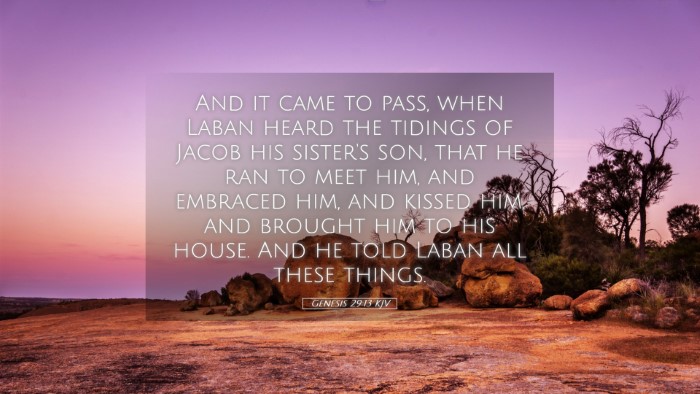Commentary on Genesis 29:13
Verse: “And it came to pass, when Laban heard the tidings of Jacob his sister's son, that he ran to meet him, and embraced him, and kissed him, and brought him to his house. And he told Laban all these things.”
Introduction
Genesis 29:13 marks a significant moment in the life of Jacob as he meets Laban, his uncle, after fleeing from his brother Esau. This verse introduces us to the familial bonds and the cultures surrounding hospitality and kinship in the ancient Near East. The interaction encapsulates themes of family reunion, love, and the unfolding providence of God in Jacob's life.
Insights from Public Domain Commentaries
Matthew Henry's Commentary
1. The Nature of Laban’s Greeting
Henry notes the warmth of Laban’s greeting, emphasizing the familial affection that comes with such reunions. The act of running to meet Jacob signifies Laban's eagerness to welcome him, illustrating the cultural practice of hospitality. This response not only reflects Laban's character but also underscores the joy found in reconnecting with family.
2. Jacob’s Revelation of His Journey
Henry points out that Jacob shares his experiences with Laban, indicating transparency and the importance of communication in family relationships. Jacob's tales, filled with divine encounters and struggles, foreshadow the challenges and blessings that await him in Haran. This openness is essential as it sets the tone for their future interactions.
Albert Barnes' Commentary
1. The Significance of Kinship
Barnes elaborates on the concept of kinship and its social implications during this period. The bond between Jacob and Laban extends beyond mere blood relation; it encompasses mutual responsibilities and expectations. The encounter is rich with both symbolic and practical meanings, reflecting societal norms of supporting and sheltering family members in need.
2. Laban’s Character
Barnes discusses Laban’s character, suggesting that his reception of Jacob may also be motivated by self-interest. While Laban shows affection, he recognizes the benefits of having Jacob, who brings skills as a shepherd and resources. This multifaceted dynamic will develop further as the narrative unfolds, highlighting themes of loyalty and deception.
Adam Clarke's Commentary
1. Cultural Practices of Greeting
Clarke provides insight into the customs of greeting, noting that embracing and kissing were typical gestures of welcome among family within the Hebrew culture. Such practices communicate a deeper emotional tie and convey acceptance, setting a welcoming atmosphere for Jacob’s new beginning with Laban.
2. The Importance of Sharing Stories
In Clarke’s view, Laban's willingness to listen to Jacob’s narratives represents the importance placed on oral traditions and familial histories. The exchange of stories not only fosters connection but also serves to reaffirm familial identity and purpose, especially amidst turbulent backgrounds.
Theological Reflections
1. Divine Providence in Relationships
This encounter showcases the providence of God in orchestrating Jacob’s journey. The unfolding of events is not mere chance but rather a part of God's larger plan for Jacob’s life, which includes his eventual transformation and role in the covenant family.
2. The Dynamics of Trust and Betrayal
As the narrative progresses, Jacob's relationship with Laban introduces complexities regarding trust. Initially, the embrace signifies acceptance; however, the eventual tension between them raises critical discussions about integrity and betrayal within familial contexts. Jacob's journey will ultimately reflect the challenges of navigating relationships that intertwine love with self-interest.
Practical Applications for Today’s Context
- Emphasizing Family Unity: This verse underscores the importance of maintaining strong familial bonds, encouraging individuals to engage regularly in warm, affectionate greetings and gatherings that strengthen relationships.
- Encouraging Transparent Communication: Jacob's sharing of his experiences teaches the necessity of openness in relationships, prompting today's believers to share their journeys and struggles to foster empathy and support within families and communities.
- Understanding the Role of Culture: Reflect on how cultural practices impact our expressions of love and hospitality, inspiring communities to create welcoming environments that respect and embrace diverse backgrounds.
Conclusion
Genesis 29:13 serves as a rich starting point for exploring themes of family, loyalty, and God's providence. By drawing from the insights of renowned commentators, we uncover deeper meanings and implications of this encounter, providing valuable lessons for today's pastors, students, and scholars. The transition into Laban's house marks not just a physical relocation for Jacob, but a pivotal movement in the overarching narrative of God's covenant people.


